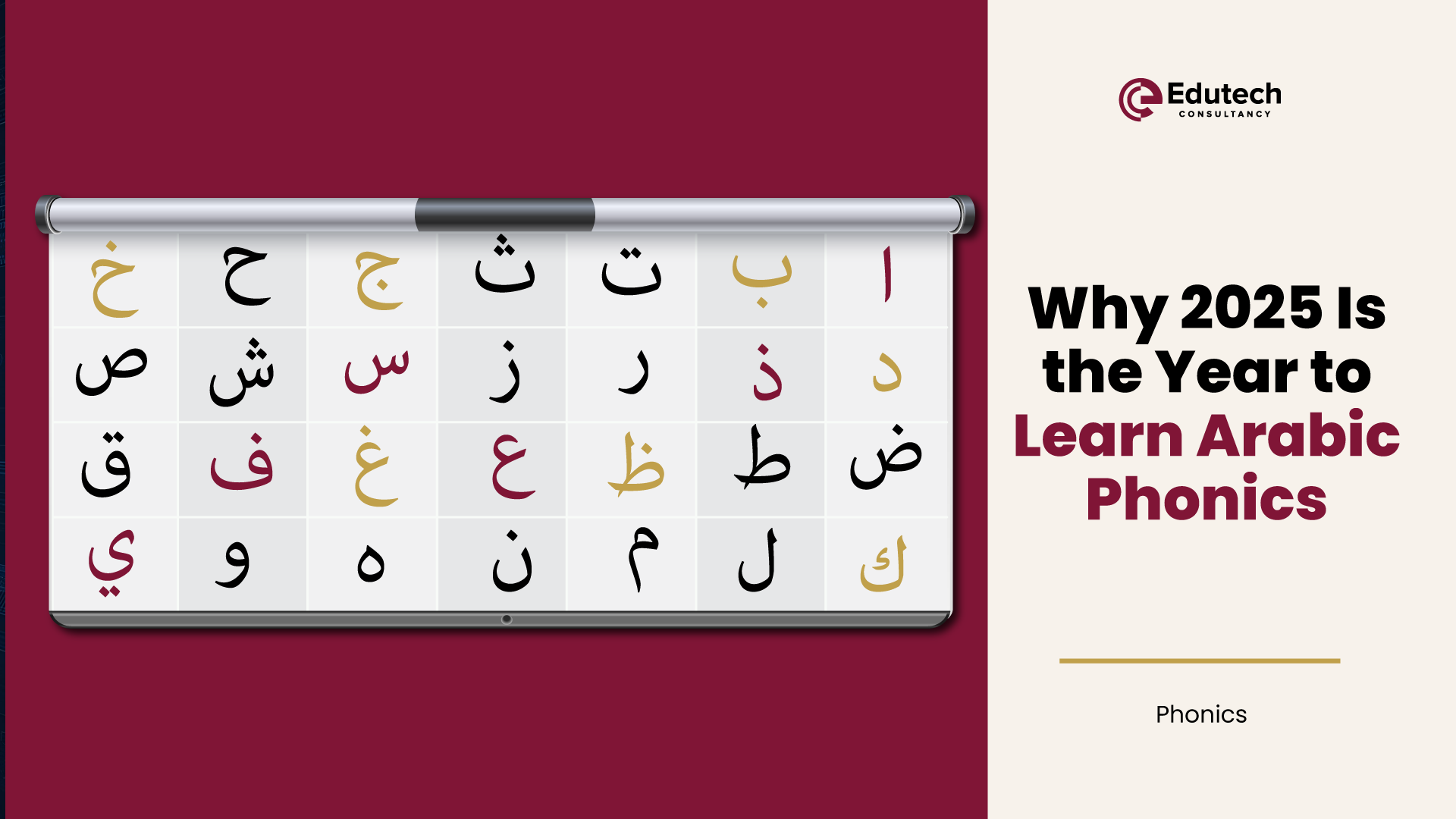Why Arabic Phonics Matters
Teaching children to read Arabic is more than memorizing words. When they understand the sounds behind letters, reading becomes easier and more enjoyable.
A structured Arabic phonics workshop helps teachers deliver lessons that are clear, engaging, and effective. Children enjoy learning Arabic while developing strong early literacy skills. For teachers, it provides confidence, practical methods, and ready-to-use tools.
What Arabic Phonics Means
Arabic phonics teaches children the relationship between sounds and letters. Instead of memorizing words, children learn to:
- Hear and recognize individual sounds
- Match sounds with letters and diacritics
- Blend sounds to form words
- Read sentences and understand meaning
Because Arabic letters change shape depending on their position, teachers need proper guidance to help students. That’s why participating in an online Arabic phonics workshop for educators can make a real difference. Learn more about the Arabic language’s importance in Qatar.
How Phonics Based Arabic Learning Helps Young Learners
Phonics based Arabic learning helps children build a strong reading foundation. With this approach, learners can:
- Recognize sounds quickly
- Speak clearly and confidently
- Read new words without memorizing
- Spell accurately
- Grow their vocabulary naturally
Programs like Arabic synthetic phonics (دال program) guide students step by step. They help students become confident readers by connecting sounds to letters, blending words, and understanding sentences.
Common Challenges Teachers Face
Teaching Arabic phonics can be challenging. Some common difficulties include:
- Differentiating similar sounds
- Pronouncing letters correctly
- Letters changing shape in different words
- Blending sounds smoothly
- Keeping young learners focused
- Finding structured Arabic phonics curriculum
A well-structured webinar helps teachers overcome these challenges with practical strategies and easy-to-use resources.
Why Join an Arabic Phonics Workshop
By joining an Arabic phonics workshop, teachers gain:
- Step-by-step guidance to teach Arabic phonics
- Practical Arabic early literacy strategies
- Activities for blending and reading words
- Story-based lessons to make learning fun
- Classroom-ready phonics cards and teaching guides
This online Arabic phonics workshop for educators is perfect for teachers, carers, and early years educators in Qatar and the GCC. You can join from anywhere and immediately apply what you learn in classrooms or at home.
How the Synthetic Phonics Approach Works
The Arabic synthetic phonics (دال program) uses a simple, structured method to help children learn:
- Recognize sounds
- Match sounds to letters
- Blend sounds into words
- Read sentences
- Understand the meaning of what they read
This approach builds reading confidence and fluency from the earliest stages, giving children a strong foundation for future learning.
What You Gain From the Webinar
Teachers attending the Arabic phonics workshop will get:
- Practical early literacy strategies
- Step-by-step blending and reading exercises
- Story-based lessons for young learners
- Fun and engaging activities
- Classroom-ready teaching resources
This ensures teachers feel confident and equipped to teach Arabic phonics effectively.
About Edutech Consultancy
Edutech Consultancy Arabic workshop focuses on practical phonics based Arabic learning. Our webinars provide multisensory tools, story-based teaching, and ready-to-use materials that make lessons simple and effective.
We offer Arabic phonics training in Qatar and online to support teachers across the GCC. Some sessions are part of larger initiatives such as Arabic phonics webinar GCC or upcoming Arabic phonics webinar 2025.
Sign up for the Arabic phonics workshop today. Visit our Arabic Phonics Training to reserve your spot and start helping children read Arabic with confidence.
Frequently Asked Questions (FAQ)
1. What is Arabic phonics?
Arabic phonics teaches children how sounds and letters work together. Instead of memorizing words, they learn to blend sounds, read new words, and understand what they read.
2. Who should attend the Arabic phonics webinar?
Teachers, early years educators, school staff, and caregivers who want to help children read Arabic confidently can benefit from this webinar.
3. What is phonics based Arabic learning?
It is a structured approach where children learn sounds first, match them to letters, and then blend them to form words and sentences. This builds strong reading skills naturally.
4. How does the دال synthetic phonics program help?
The دال program uses step-by-step teaching methods to help children recognize sounds, blend words, and read sentences independently. It’s designed for early learners to build confidence and fluency.
5. Can this webinar help with classroom planning?
Yes. The Arabic phonics webinar provides teachers with ready-to-use guides, exercises, and fun activities that can be implemented in classrooms or at home.
6. Is this webinar suitable for teachers across the GCC?
Absolutely. Edutech Consultancy’s Arabic phonics webinars support teachers in Qatar and GCC countries with practical tools and strategies for early literacy.


